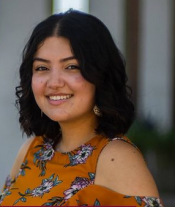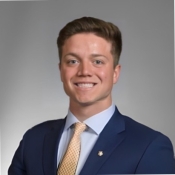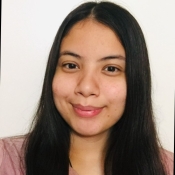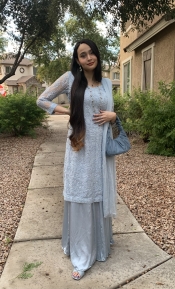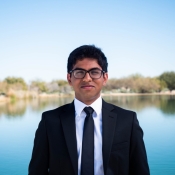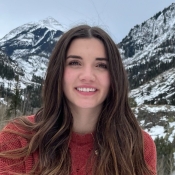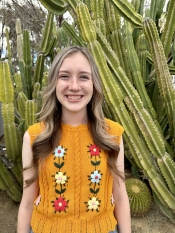Barrett, The Honors College at ASU announces its 2024 outstanding graduates
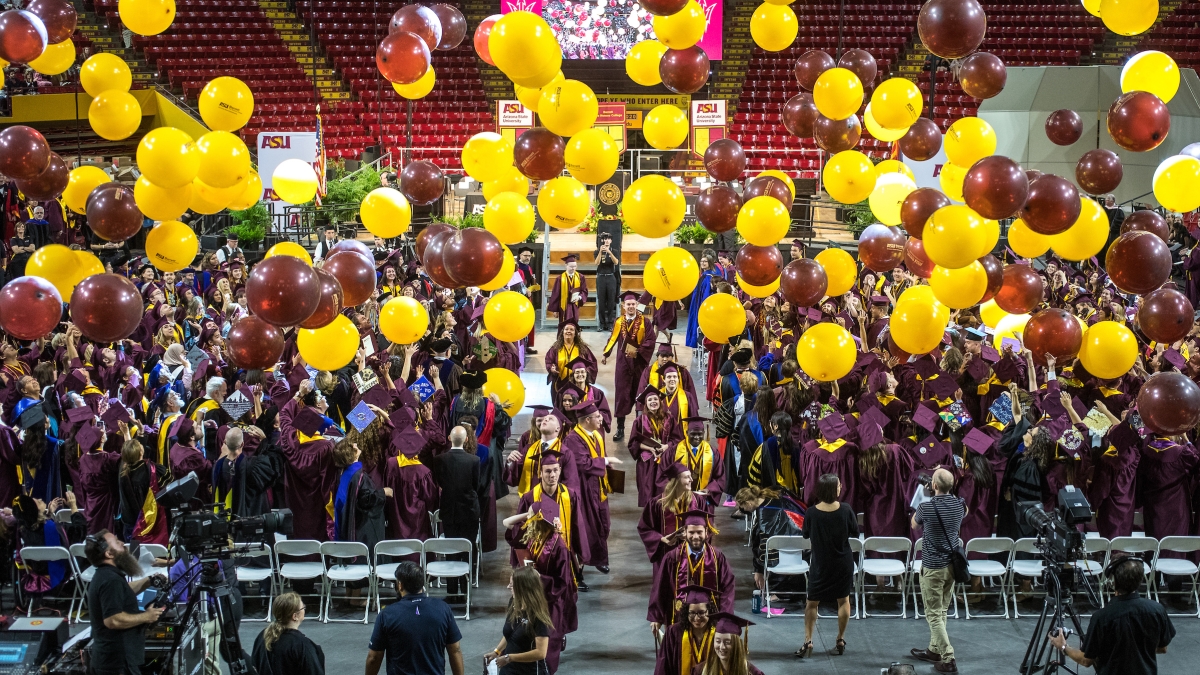
Barrett, The Honors College at Arizona State University has named seven outstanding graduates from the spring 2024 graduating class who will be recognized for their academic prowess, leadership, service, community involvement and creativity at the honors college’s convocation on May 6. ASU photo
Barrett, The Honors College at Arizona State University has named seven outstanding graduates from the spring 2024 graduating class who will be recognized for their academic prowess, leadership, service, community involvement and creativity at the honors college’s convocation set for 2 p.m. on May 6 at Desert Financial Arena on ASU's Tempe campus.
“Barrett Honors College’s core values are community and belonging, leadership and agency, courage and curiosity. These outstanding graduates are exemplars of the values in action and represent the excellence of all honors students. We’re confident they’ll all take these values into whatever they do next, including careers, graduate and professional schools, and public service,” said Barrett Honors College Dean Tara Williams.
The spring 2024 Barrett Honors College Outstanding Graduates are recognized in the categories of Outstanding Graduate, Outstanding Research, Outstanding Leadership and Outstanding Creativity. They are:
Outstanding Graduate
Sadaf Asadifar
Asadifar is receiving Bachelor of Science degrees in neuroscience and psychology and a Bachelor of Arts degree in global health from the College of Liberal Arts and Sciences. Her goal is to become a cardiothoracic surgeon.
She was an undergraduate research assistant in the Behavioral Neuroscience of Memory and Aging laboratory, where her research focused on the effects of sex hormones on cognitive and brain changes during aging using rat models.
For her Barrett honors thesis, titled “How many new friends can a menopausal rat remember? Developing a new task of social recognition with an increasing working memory load,” Asadifar and a graduate student developed a novel test of memory in rats.
Asadifar received many scholarships, including the Wahl Family Scholarship, HonorHealth Foundation Advisory Council Scholarship, Dariel Overby Memorial Scholarship, Dean’s Council Scholarship, New American University Scholar President’s Award, Austin James Service Scholar Award, Smith Marshall Scholarship, President Barak Obama Scholar Award and Mak Pak Chiu and Mak Soo Lai Hing Memorial Scholarship.
She was a first author and presenter on three presentations about hormone therapy and menopause effects on memory, including one as a Banner-ASU Neuroscience Scholar and another at the Arizona Alzheimer’s Consortium.
With her family, as a youngster, Asadifar left her home country of Iran, sought asylum in Turkey for two years and ultimately came to the United States and became a citizen. She told her story at an Ignite ASU event last year.
She has been active in community service, running classes focusing on empowerment for children of Baha’I Faith, serving as an Arizona Refugee College Success mentor for high school students, and volunteering at the International Rescue Committee Welcome Center Asylum Seeker Shelter.
She served as financial advisor to the Global Women’s Health Initiative, a Barrett Honors College Peer Academic Leader, and a Civitutors tutor for an elementary school student. In addition, she worked as an aide in the Ira A. Fulton Schools of Engineering student services department and in ASU Financial Aid Services.
Outstanding Research
Rafael Ortiz III
Ortiz is receiving a bachelor’s degree in astrophysics from the School of Earth and Space Exploration.
He received the New American University President’s Scholarship, the 2020 Gold Medal in Science, and the 2023 Barrett Honors College Award for Innovation. He was also a finalist for Outstanding Undergraduate Student of the Year in 2023.
Ortiz worked on the School of Earth and Space Exploration’s James Webb Space Telescope (JWST) PEARLS project, during which he used two-dimensional light profiling methods and spectral energy distribution modeling codes to study the point spread functions in local active galactic nuclei.
He was co-author of six publications in the Astrophysical Journal, a leading journal for astrophysics. As an ASU NASA Space Grant recipient and intern, Ortiz assisted with the processing of JWST cosmic ray rejection data, which cleans JWST images by identifying and removing stray cosmic rays from images.
He conducted original research as an intern at the Fermilab National Accelerator Laboratory during the summers of 2019 and 2022, during which he contributed to the development of code designed to analyze real data from the Muon g-2 particle physics experiment. He later launched a prototype of distributed tracing software for optimizing simulations in the Compact Muon Solenoid experiment. In 2019, he received the Fermilab Science Award for his work there.
Ortiz served as a Barrett Honors College teaching assistant and completed an honors thesis titled “Why Do We See Beauty?” that included a self-published 51-page book of poems and a 96-page paper on the interdisciplinary interaction between Taoism, philosophy, Buddhism, spirituality and art.
For four years, he was a member of Honors Devils, a student organization that assists with recruiting honors students by giving informational tours. He served as a student body senator and as the director of student affairs for Undergraduate Student Government on the Tempe campus. He was chief of staff of the Leadership Forum at ASU and president of the Order of Omega Leadership Honors Society.
As an ASU Space Student Ambassador, Ortiz worked with SESE, the ASU Fulton Schools of Engineering and representatives of private industry to support student initiatives and research projects.
Jaira Muñoz Zavala
Muñoz Zavala is receiving a bachelor’s degree in forensic science from the New College of Interdisciplinary Arts and Sciences and a bachelor’s degree in sculpture from the Herberger Institute for Design and the Arts.
She was the recipient of the ASU STEM TRAIN Interdisciplinary Natural Sciences Scholarship, the Buzz Sands Chevrolet Endowment Scholarship, the J.R & B. Nelson Scholarship and the Ridgway Scholarship.
Muñoz Zavala worked in the ASU Forensic Entomology and Wildlife Laboratory, where she participated in four different research projects. She completed five oral presentations, including with the North American Forensic Entomology Association and the Entomological Society of America – Pacific Branch, and two poster presentations.
She won third place in the student oral presentation competition at the 2022 Entomological Society of America – Pacific Branch meeting for her project titled “Outside of colonization: An analysis of initial insect arrival and other insect interactions with decomposing remains throughout the year in Arizona.”
She won second place for her research poster presentation on an analysis of flies’ arrival to decomposing remains during winter in Arizona at the 16th annual WAESO Student Research Conference in 2022. She also won third place in the student poster competition at the 2023 NCUIRE Research Symposium.
Muñoz Zavala gave a talk at the 2023 Entomological Society of America – Pacific Branch conference titled “A new perspective on death: Combining art and science.” She defended her honors thesis, titled “Initial insect arrival to decomposing remains in Phoenix, Arizona,” in English and Spanish.
Outstanding leadership
Orchee Syed
Syed is receiving a bachelor’s degree in psychology with a minor in sociology from the College of Liberal Arts and Sciences.
She has been a leader inside the classroom, showing a collaborative attitude toward her peers by engaging them in class conversations and doing outstanding work, such as a nine-page essay about capitalism during pandemics titled “400 Years of Eating the Rich.”
Since fall 2020, Syed has served as a writing tutor at the Barrett Writing Center, mentoring other students in writing argumentative essays and honors theses, promoting the center at orientation events and through social media, hosting writing workshops, and helping recruit and interview new tutors.
Syed helped run the Barrett Writing Center, led writing tutor staff meetings and trained tutors to give feedback on honors theses. She contributed to Barrett curriculum by helping redesign the required Barrett thesis workshops to be more equitable and student centered, and contributed to panel discussions and small group facilitation.
Syed served as an undergraduate teaching assistant in the ASU Department of Psychology and worked as a research assistant in the Lifespan Development Lab. She also worked as a data collector and analyst for the ASU Community Energy Engineering Initiative focused on incentivizing middle and high school students from low-income neighborhoods in Phoenix to get involved in STEM.
She interned at an outpatient clinic serving Indigenous Valley residents, contributed to a STEM and community service program at Phoenix public schools, advocated for marginalized students of color to be involved with research in the ASU Department of Psychology, and was a member of the Barrett Choir. She also received the New American University Scholarship and Psychology Scholar Award.
Her honors thesis focused on examining similarities and differences in historical change reports of pain in middle-aged adults across 16 nations. Syed plans to pursue a doctoral degree in psychology.
Yash Raka
Raka is graduating with a bachelor’s degree in biomedical informatics from the College of Health Solutions.
As an ASU Undergraduate Student Government senator, he led mental health initiatives, such as keeping counseling free for all ASU students. As a student ambassador in the College of Health Solutions, he represented students in monthly meetings with the dean and coordinated biweekly presentations at high schools across Arizona to inform students about the benefits of pursuing a university education.
He volunteered as an instructor in the ASU Prison Biology Initiative, where he worked with students studying introductory biology at the Eyman-Florence prison complex. As a group facilitator at the New Song Center for Grieving Children, he assisted support groups for children aged 8–10 who lost loved ones.
He was a research fellow in the ASU School of Life Sciences, conducting research on Zika-carrying mosquitos, analyzing the impact of fungicide on honeybees, and modeling honeybee heat stress to predict the effects of global warming on beehives.
He worked in the ASU Luminosity Lab implementing moonshot solutions and mapping hospital inequity distribution using geographic information systems. He was a health project fellow at the ASU Center for the Study of Race and Democracy, where he founded the Mental Health Equity Symposium, and a clinical research intern at the Washington University School of Medicine in St. Louis in the summer of 2022.
He co-authored two research articles — one on oncology patients and another on the impact of fungicide exposure on honeybees. He won first place in the Mayo Clinic Health Futures + CHS Clinical Solutions Competition in April 2023 and was an honorable mention in the National Academy of Medicine STI Hackathon last October.
Outstanding creativity
Lyndsey Anderson
Anderson is graduating with a bachelor’s degree kinesiology from the College of Health Solutions.
For her honors thesis, Anderson created a physical therapy program for under- and uninsured children with Down syndrome. The program features a game called “Rainbow Monster Madness” and is available online. She hand-drew the characters for the game, which combines fun play with physical therapy.
Anderson served as president of the ASU Kinesiology Honors Society in the College of Health Solutions and was a Barrett Academy of Excellence Scholar. She received a Certificate of Recognition and Outstanding Service from the Kinesiology Honors Society, an ASU Award of Excellence in Chemistry, an ASU Sun Devil Football Athletic Training Intern Scholarship, the New American University President’s Award and the Townsend Family Scholarship.
She worked as a physical therapy technician at a clinic in Scottsdale, Arizona, a youth tutor and mentor in Paradise Valley, Arizona, and as a student athletic trainer for the ASU football team.
She will pursue a doctorate of physical therapy at the University of Colorado in Denver Anschutz Medical Campus.
Morgan Cywinski
Cywinski is receiving a bachelor’s degree in social work from the ASU School of Social Work in the Watts College of Public Service and Community Solutions.
For her honors creative project, she researched the concerns and needs of young hospitalized children and designed and developed “The Bedside Box of Play,” a box with play activities geared toward 5- to 11-year-old children experiencing hospitalization.
She procured funding to create 30 boxes, with materials in English and Spanish, which she donated to a children’s unit at a local hospital. The boxes help children and their families by providing an easy way of incorporating play into the hospital environment while promoting healthy child development and coping skills.
Cywinski interned at A New Leaf East Valley After School Program for school-age children and Everybody Matters, a nonprofit organization dedicated to teaching lifelong coping and social skills to children. She was a counselor for Camp Ronald McDonald for Good Times and volunteered at Banner Hospice Dottie Kissinger Bereavement Camp, Phoenix Children’s Hospital, and Helen’s Hope Chest.
She received the ASU New American University Scholarship and the Garcia Family Foundation Scholarship.
More University news

3 ASU students earn Goldwater Scholarships for STEM research excellence
Three Arizona State University students have been named Goldwater Scholars for 2025, placing them among the nation’s most promising undergraduates pursuing research careers in science, engineering…

Provost Teaching Awardees, Charter Professors empower local communities, students
The ASU Charter embodies the university’s commitment to student success and research of public value and responsibility to the community. In recognition of its importance, each year, Executive…

New online Bachelor of Social Work program exceeding enrollment expectations
Social workers are in big demand.Citing U.S. Bureau of Labor Statistics figures, the National Association of Social Workers projected the profession will grow 7% by 2033, faster than the average for…


